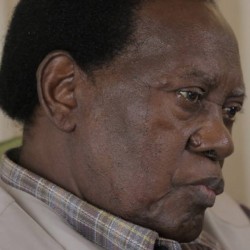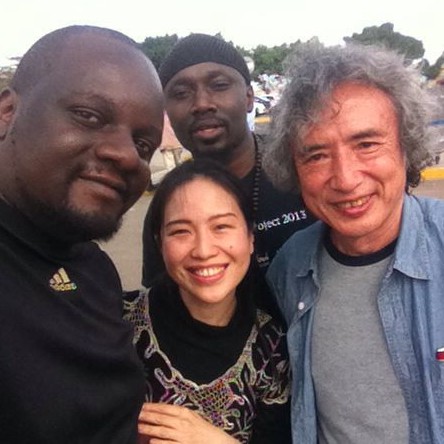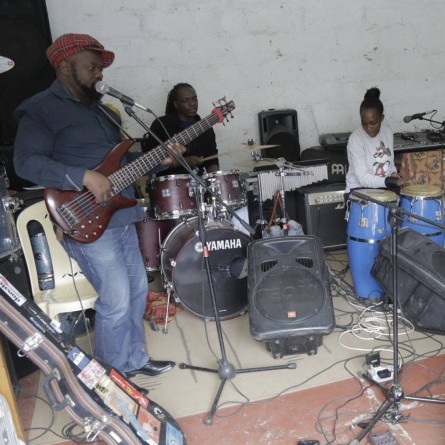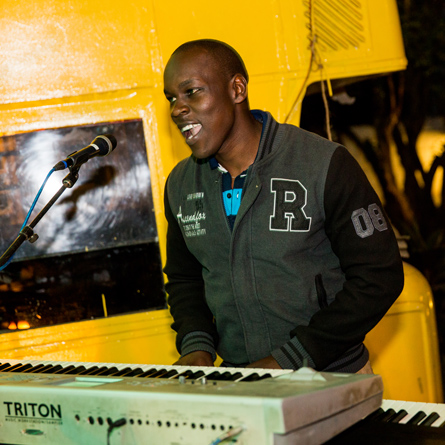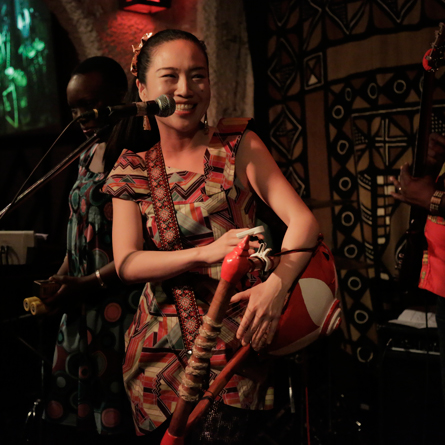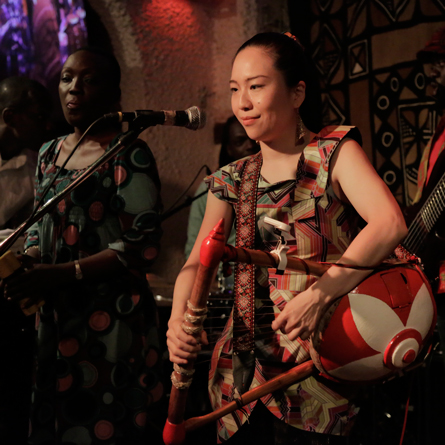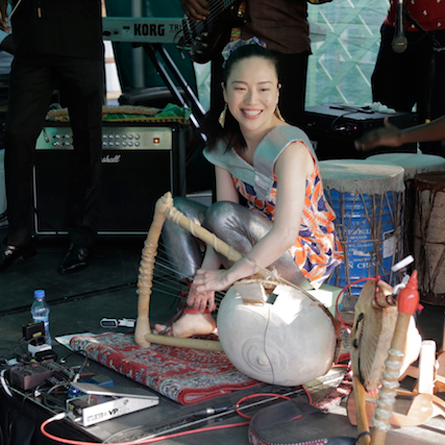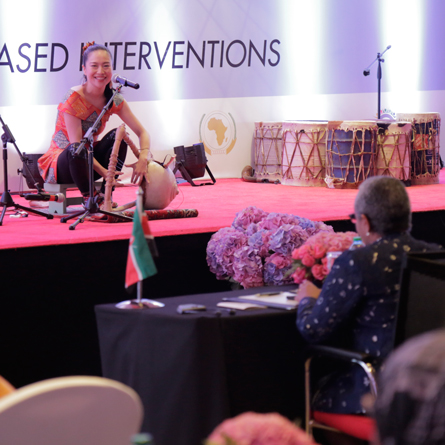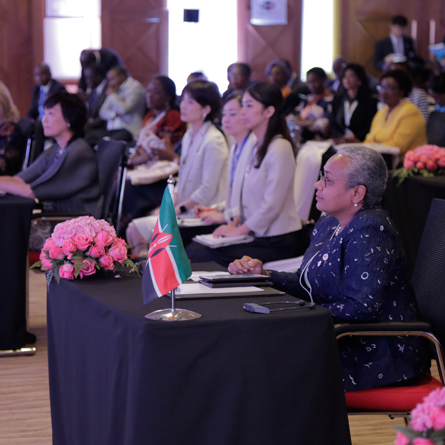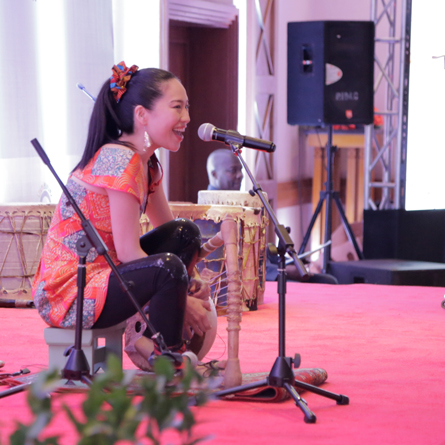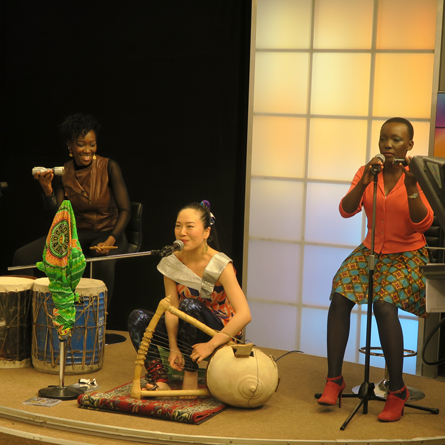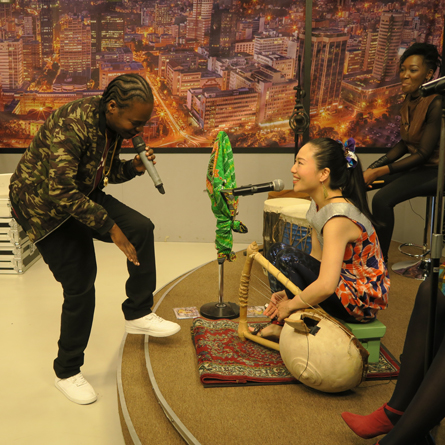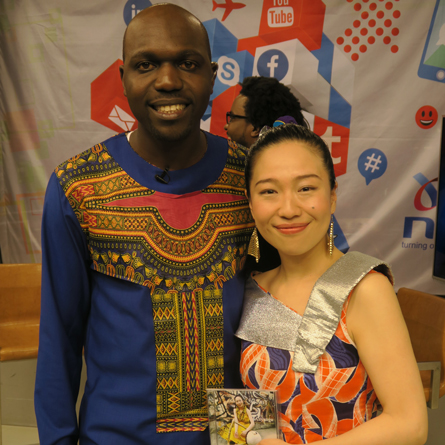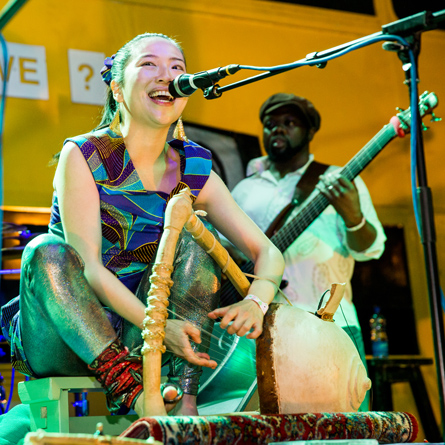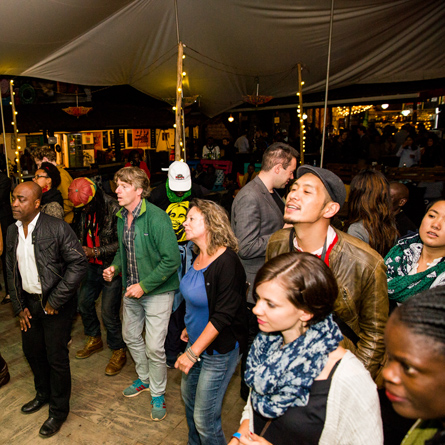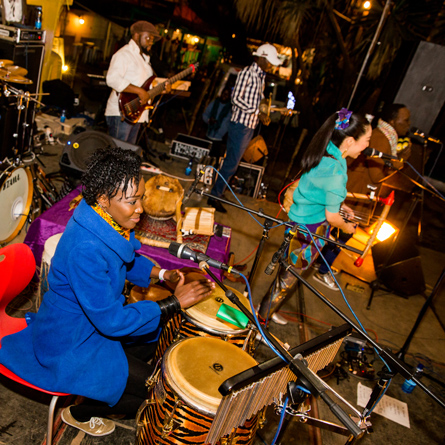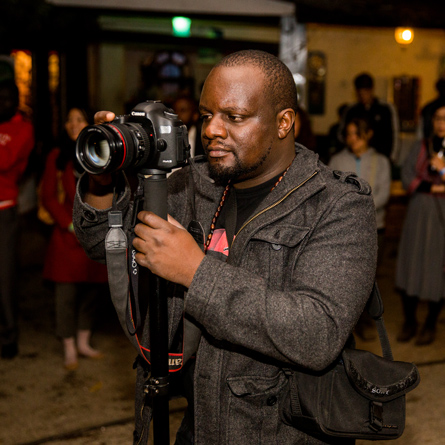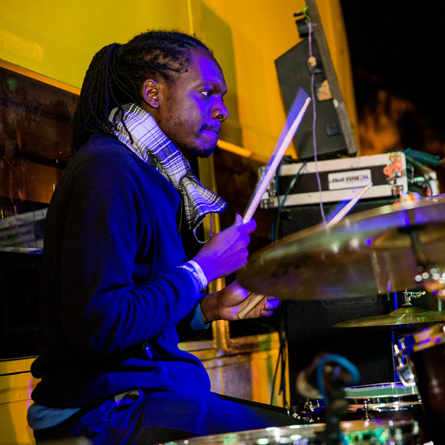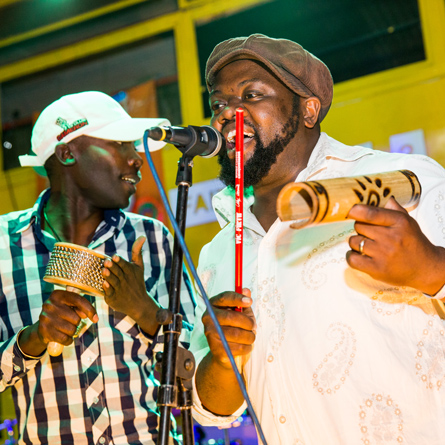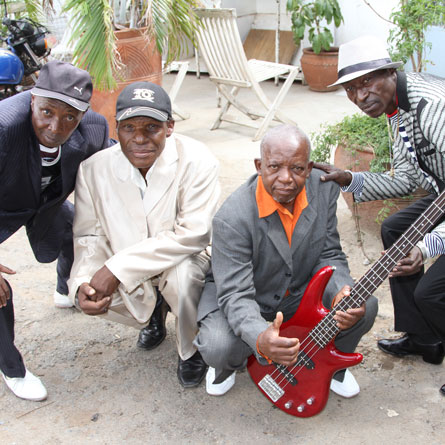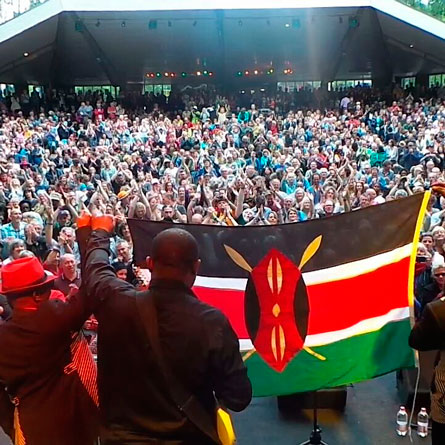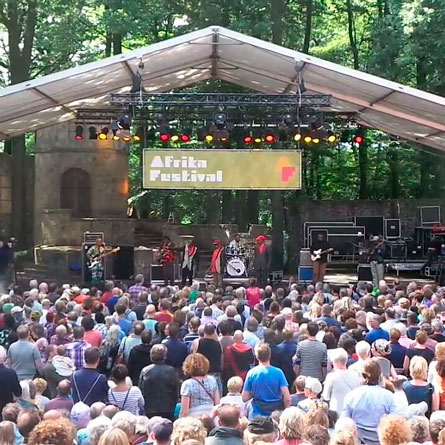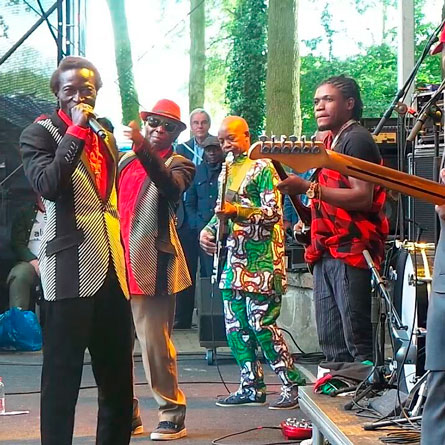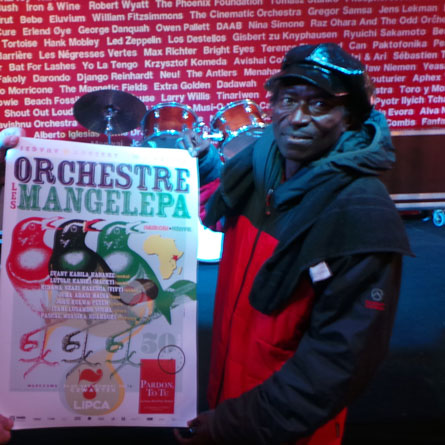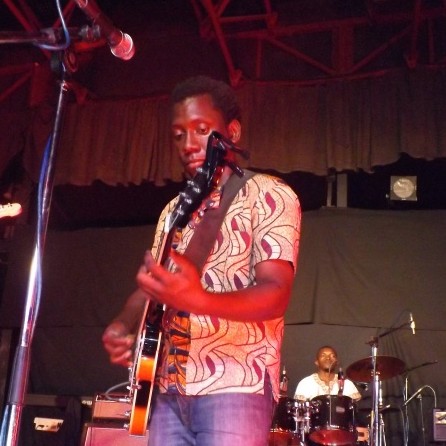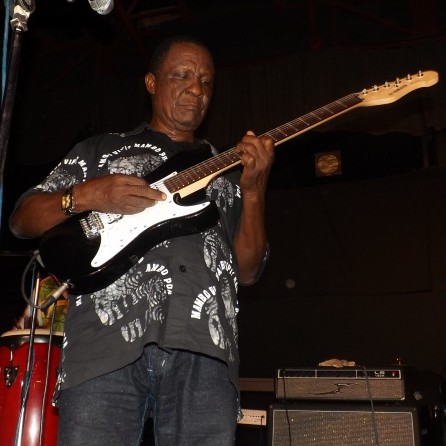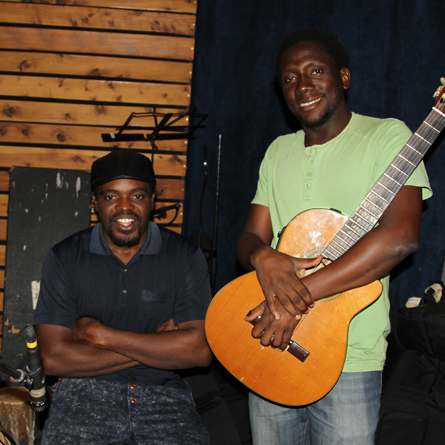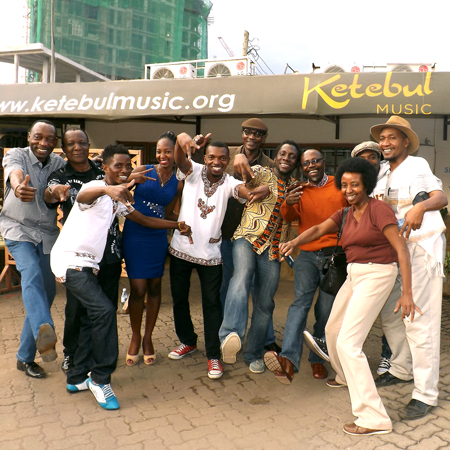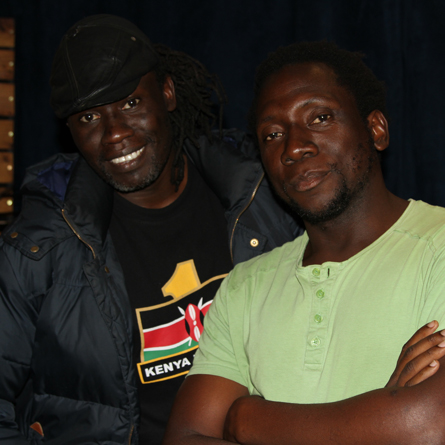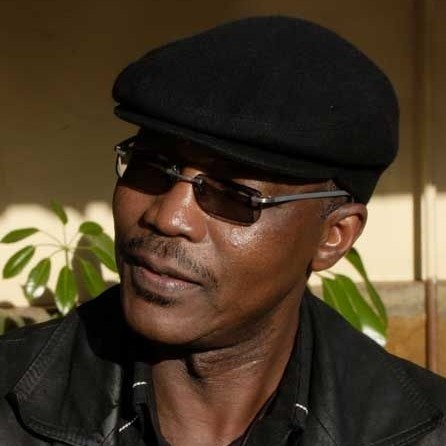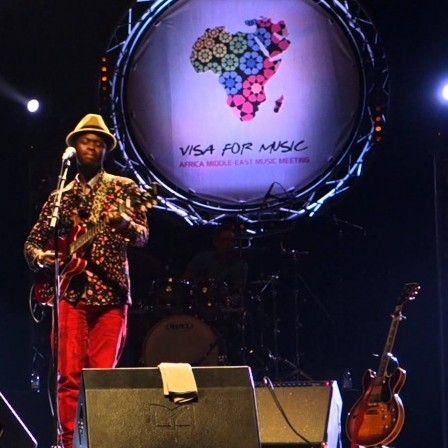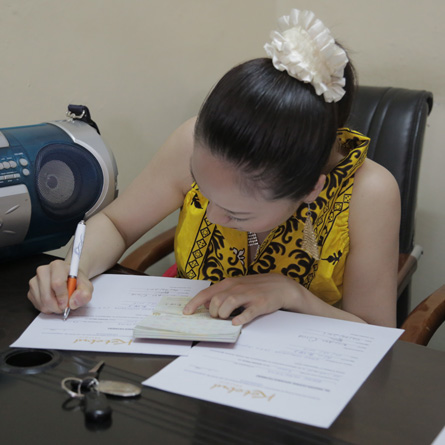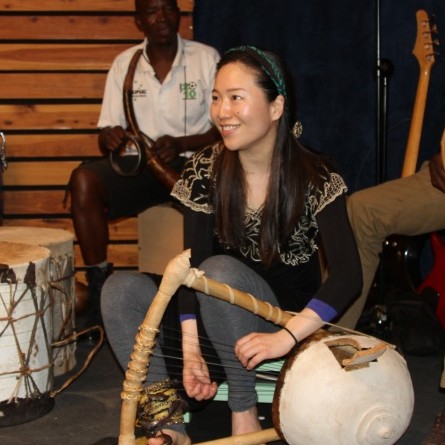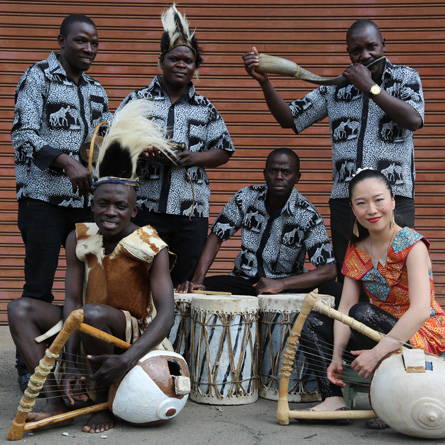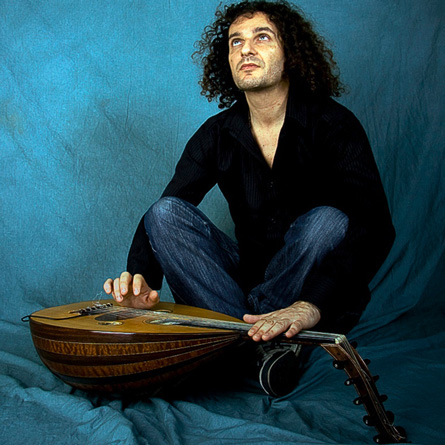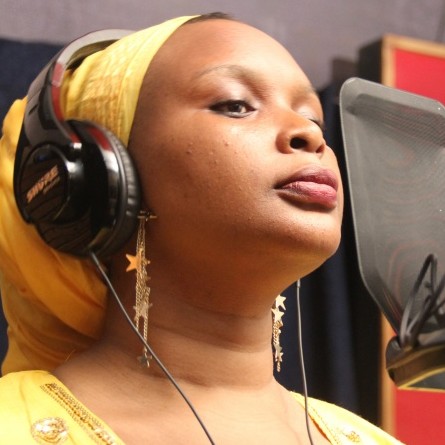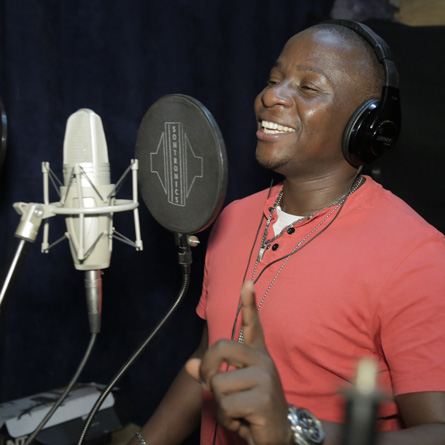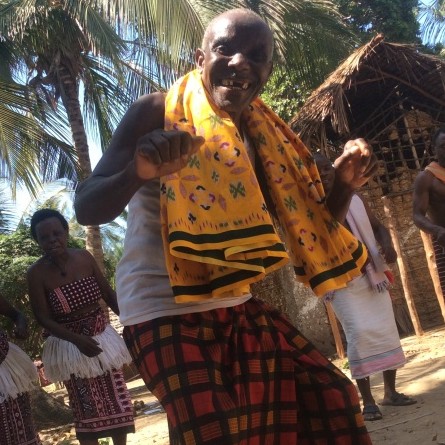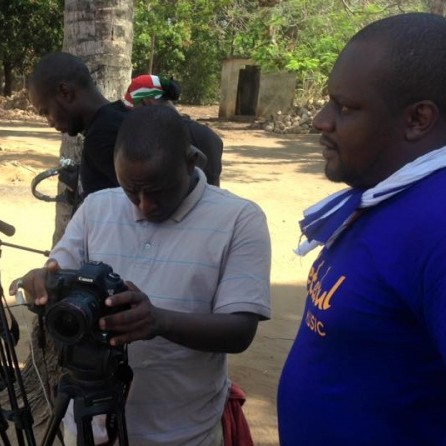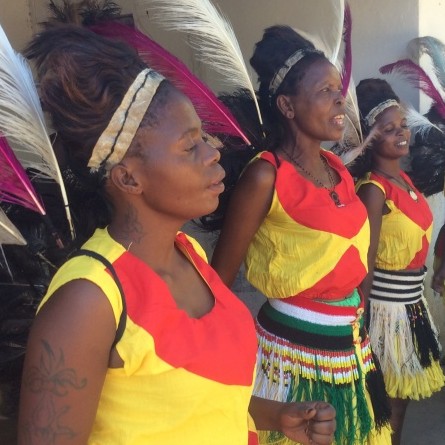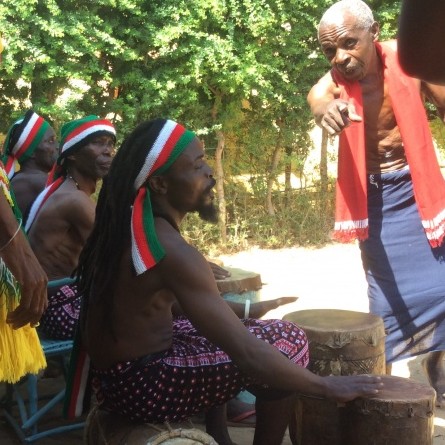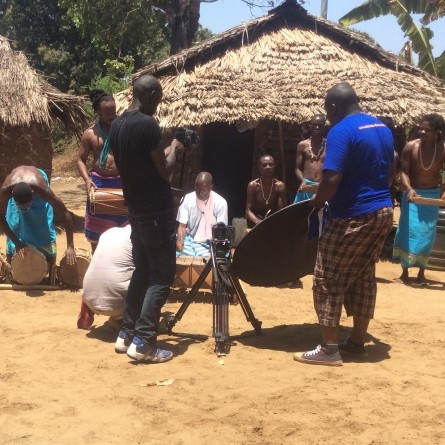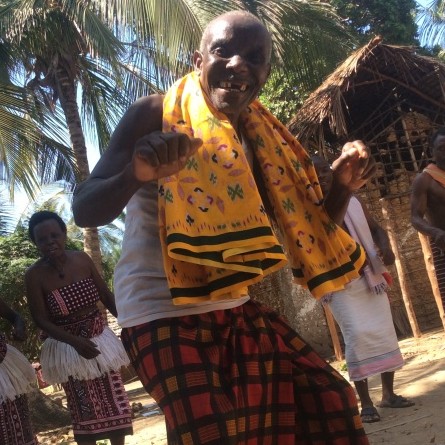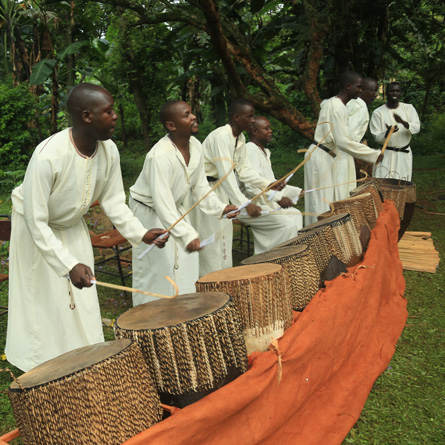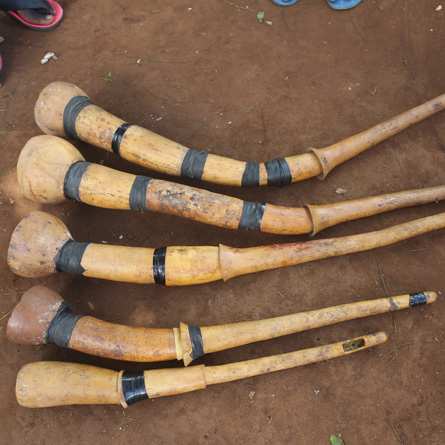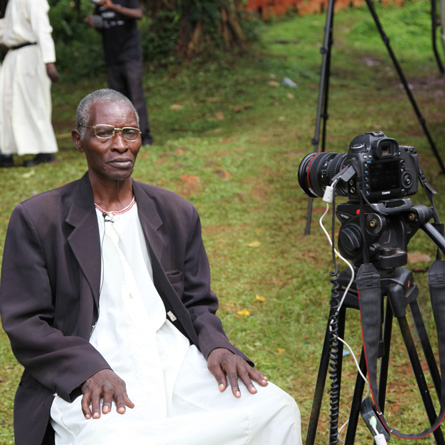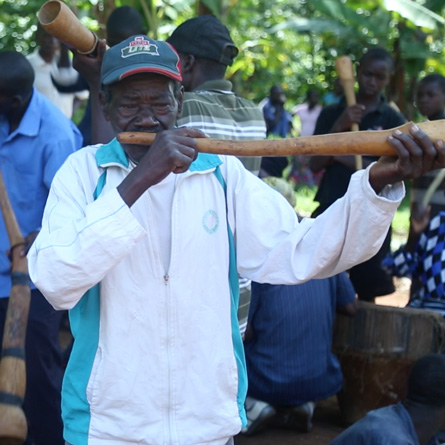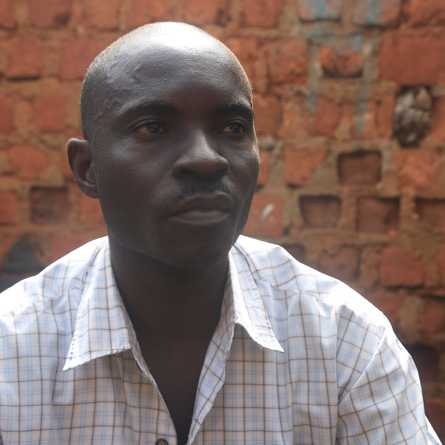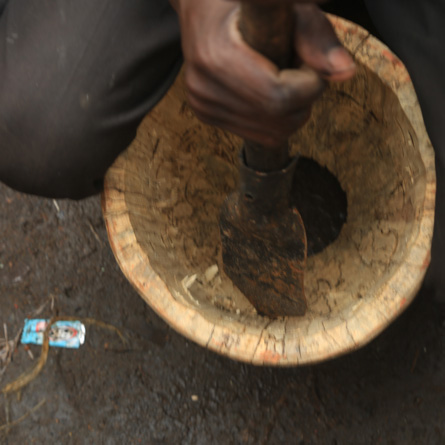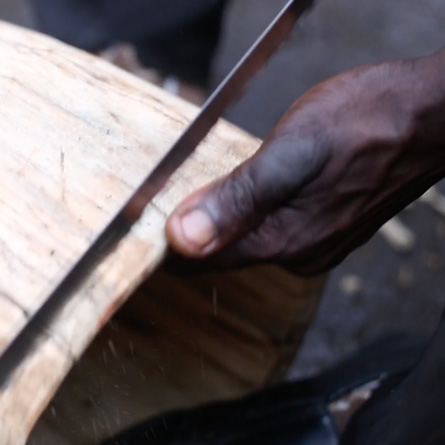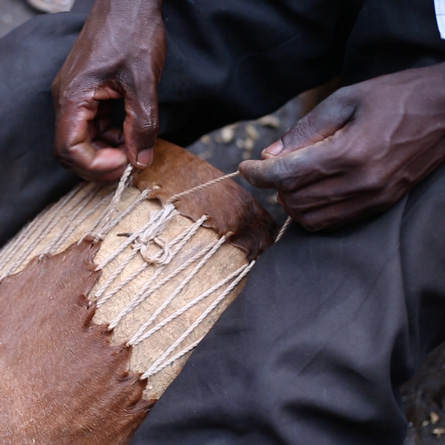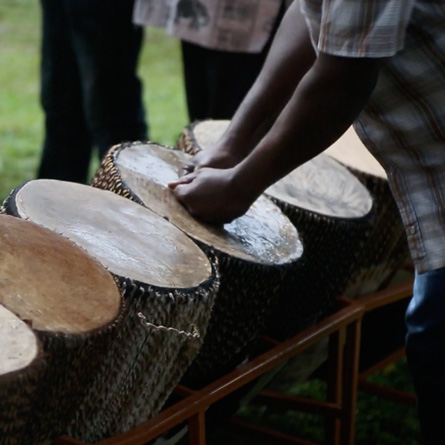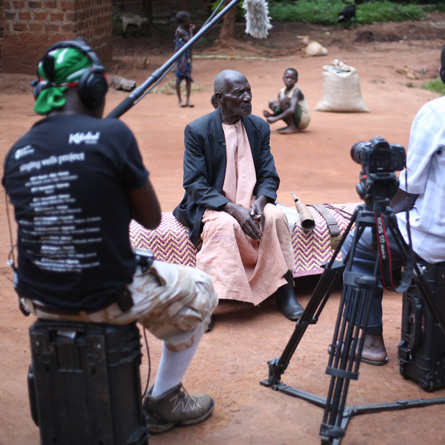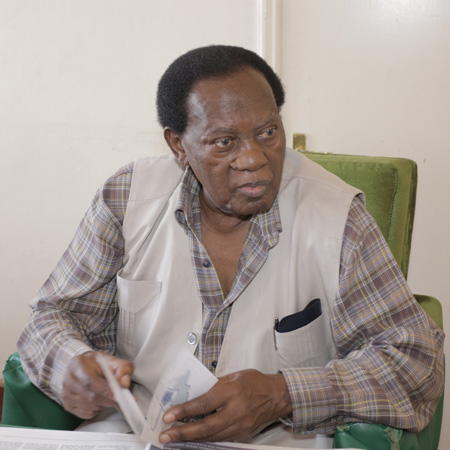Safari Ya Eriko Mukoyama! Anyango Tours Nairobi
Japanese nyatiti diva, Anyango arrived in Kenya on the 19th of August 2016 on a mission to promote her new album, Anyango: The Safari of Eriko Mukoyama. The visit entailed a number of shows in Nairobi aimed at promoting her brand new album.
Rehearsals Day 1… A group of multi-talented musicians converged at Ketebul Music Studios to join Anyango in the first step of the journey.
With Kasiva Mutua on percussions, Ricky Nanjero on bass guitar, Michael Okinyo on the keyboard, Gervais Katumba on drums, Boaz Jagingo playing the orutu; a single-stringed traditional instrument and background vocalist Lydia Ogoti on board… Anyango’s new band was complete!
On the 25th of August Anyango had her first show at Thursday Nite Live @ Choices where she wowed the crowd with her brilliant live act.
The four-hour live performance, filled with beautiful nyatiti sounds and the angelic harmonies of Anyango and her band doubled up as the official launch of Anyango’s album, Anyango: The Safari of Eriko Mukoyama.
The album consists of 15 songs in total including a collaboration with Kenge Kenge Orutu System, a traditional band from Kenya.
The song entitled ‘Anyango Nyar Japan Meets Kenge Kenge’ is a song Anyango wrote right after the Fukushima earthquake tragedy in Japan. It is meant to encourage the human spirit of resilience. Kenge Kenge infuse a strong traditional musical element to this song, expressing the same sentiment in Dholuo; a local language from Nyanza, Kenya.
On the 26th of August Anyango performed at the Hideyo Noguchi Africa Prize Reception at The Hilton Hotel in Nairobi.
The Prize is awarded to individuals with outstanding achievements in combating various infectious diseases in Africa or in establishing innovative medical service systems. It is awarded after every five years.
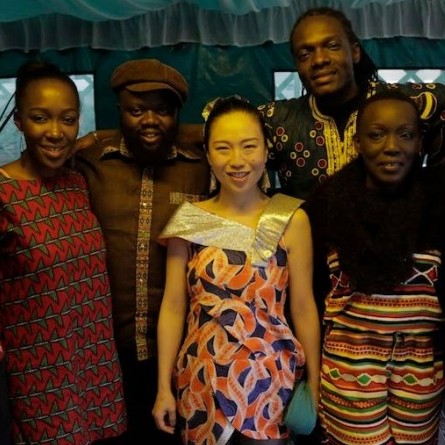
Left-Right: Kasiva Mutua, Ricky Nanjero, Anyango, Gervais Katumba and Lydia Ogoti at The Hideyo Noguchi Peace Prize reception
27th of August 2016, Anyango performed at a symposium held for the First Ladies of Africa at the Intercontinental Hotel, Nairobi during the Tokyo International Conference of African Development (TICAD IV)
The event was hosted by H.E. Margaret Kenyatta, First Lady of the Republic of Kenya and H.E Akie Abe, First Lady of Japan.
On 2nd September 2016 Anyango appeared on The Trend Live with Larry Madowo, a live entertainment television show aired every Friday on NTV Kenya. She was interviewed and did a short performance with an all-girl 3-piece band consisting of Kasiva Mutua, Lydia Ogoti and herself.
During the interview Anyango did an impromptu collaboration with Jua Cali, a renowned Kenyan hip-hop artist. Jua Cali rapped impressively over Anyango’s nyatiti sound.
To wrap it all up Anyango,s final show was at The Alchemist, Muthurukishion 3: Strings of The East. This went down on the 3rd of September 2016.
This 3rd edition of Muthurikishion featured Anyango who plays the nyatiti as well as DBass Ganun from Tanzania who plays the ganun, both string instruments from East Africa and the Middle East respectively, hence the name ‘Strings of The East’.
And if the music is good… You dance!!!
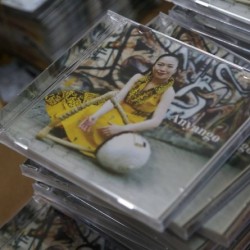
The Last Band Standing! Celebrating 40 Years Of Orchestre Les Mangelepa
Ochestre Les Mangelepa was formed in 1976 in Kenya. Originally hailing from Lumbumbashi in the Democratic Republic of Congo, they first came to Kenya as members of Ocherstre Baba Nationale of Baba Gaston. They derived their name ‘Mangelepa’ from a dance that had been invented by bandleader, Kabila wa Kabanze Evany while still in Gaston’s band. It was inspired by the French ‘Marque le pas’ (marking time).
Ocherstre Baba Nationale arrived in Dar in 1972 and soon after started recording with the Tanzania Film Company and another company called Sindimba. In 1973 they boarded an OTC bus to Nairobi to record. They recorded “Affaire Zua” and “Mapenzi ya Peremende” at High Fidelity studios. Following differences amongst the ranks, some members led by Kabila wa Kabanze Evany broke off from Orchestre Baba Nationale to form Orchestre Les Mangelepa.
In 1979 Mangelepa landed a tour of Malawi, which resulted in their other hit “Zikomo Malawi,” a live recording. When the tour ended they returned to Garden Square in Nairobi, and continued to cut records with EMI, Tobina, Jojo Records, among other labels.
Mangelepa have since recorded Safari ya Mangelepa, Golden Voices album and the DVD, The 33rd Anniversary of Mangelepa with Sound Africa.
In June of 2016, Mangelepa had their first European tour that saw them perform 9 shows in 5 different countries. The tour was organized as a collaboration between No- Nation from the UK and Planet Rock from Germany. They will soon be releasing their 40th anniversary album titled ‘Orchestre Les Mangelepa – The Last Band Standing.’
Mangelepa are truly The Last Band Standing and are one of the few bands which feature a full brass section. The surviving members from the original Mangelepa: Kabila wa Kabanze Evany, Nzazi Kalenga Kibawa Vivy, and Kaniki Lutulu Macky have been joined by younger crop of musicians who are keeping their legacy alive.
Extracted From Shades Of Benga – A Story Of Popular Music In
Kenya
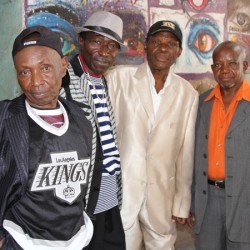
Leo Mkanyia’s New Album, Bangili, Set For Release
Leo Mkanyia is a singer, songwriter, composer, arranger and a multi instrumentalist. He plays the xylophone, various percussion and the harmonica, but his instrument of choice is the guitar. Leo is also a guitar tutor.
Born into a family of musicians, Leo has been playing music for over 20 years. He was first inspired by his father, Henry Mkanyia, a well-known jazz guitarist in Tanzania who was playing with the legendary DDC Mlimani Park Orchestra when Leo was growing up.
Leo began practicing music when he was eight-years old. He would copy chords by watching his father play, and later steal his father’s precious instrument and practice. Though his father never encouraged him to learn the trade, Leo was determined and encouraged by his mother.
It wasn’t until Leo was 12 years old that his father found out that the boy was stealing his guitar and had by then learned how to play it. Impressed by Leo’s persistence, he finally took his son under his wing and taught him the secrets of the trade.
As they say, the rest is history.
Thereafter, Leo joined several different bands and continued to develop his music and performance. In the process he also learned how to make and play his own percussion like the djembe, tumba and the xylophone.
Leo later decided to develop his own sound and style of music. He travelled around Tanzania researching on traditional dances from different tribes including the Makua, Wayao, Makonde, Gogo, and Sukuma. He discovered that Tanzanian traditional music was rich in rhythm and melody and had a “bluesy” feel to it. This inspired Leo to develop his own modern style rooted in these traditional sounds but using contemporary arrangements, which he calls, Swahili Blues.
Leo has currently finished recording material for his latest album titled ‘Bangili,’ produced by Tabu Osusa and recorded at Ketebul Music Studios in Nairobi, Kenya.
The album features several other musicians such as Winyo, Makadem, Juma Setumbi and Nyota Ndogo among others.
Bangili is set for release later this year.
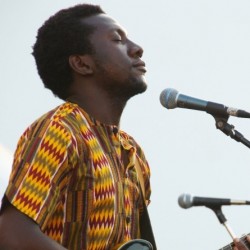
Ketebul Music Founder and Executive Director Tabu Osusa Appointed As Country Representative For Visa For Music
Ketebul Music Founding Director Mr. Tabu Osusa has been appointed as the Country Representative for Kenya in the third edition of Visa For Music (VFM) which will be held from the 16th to 19th of November 2016 in Rabat, Morocco.
Visa For Music is an annual Africa Middle East Music Meeting whose aim is to foster the development of a music market in Africa & the Middle East, highlight emerging artists, offer a suitable environment for creativity and mobility and contribute to the structure of the cultural and artistic sector.
As Country Representative, Tabu Osusa will enhance Visa For Music’s operational activities in Kenya, maintain and improve relationships with stakeholders in music, media, culture and government sectors as well as help improve productivity, efficiency and surpass VFM’s goals.
The meeting serves as an essential and major meeting place for professionals of the music industry at large.
Key objectives of Visa For Music include:
- Supporting export of musical creation from Morocco, Africa and the Middle East towards Europe and Northern markets
- Professionalizing and guiding artists of the region, to promote artistic mobility and help improve artists’ status in Southern countries
- Arousing awareness on the role of the musical stage in the socio-economic development process and in the promotion of peace and regional integration
- Setting up North-South and South-South inter-professional meetings to develop new markets with all kinds of musical productions (traditional and modern music)
- Fostering the professionalization of the sector through the development of structures representing artists and and boosting the development of creative structures in order to stimulate the musical sector
- Heading the musical sector towards new challenges of regional and international dimensions through seminars, training and expertise exchanges with professionals of the world.
Accreditations are currently open!!!
Artists, journalists and professionals can ask for their accreditation via Visa For Music Accreditation
People and organizations who are interested can also book their stand on the Visa For Music website by following the link, Visa For Music Stand Booking
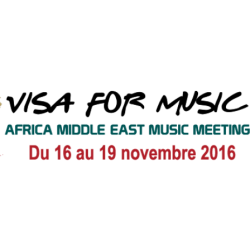
Ketebul Music Signs Deal With Anyango nyar Japan
According to the Luo community of Western Kenya, the name Anyango is given to a girl born in the morning, usually around 10 am. Eriko Mukoyama, a young Japanese artiste and the first female nyatiti player in the world identifies with this name, and is so known by her fans. She was given the name by her nyatiti master, Okumu K’Orengo. It just happens that she was actually born in the morning!
Over the years Anyango has been closely associated with Ketebul Music, both socially and business-wise. Apart from her beautiful voice and her incredible nyatiti playing skills, she possesses a lively and jovial spirit, always surprising people by her ability to speak Swahili and Luo.
On the 16th of February 2016, Anyango paid us yet another visit. This time, the aim was to sign a distribution contract with our organization. This basically makes Ketebul Music her official agents in Eastern Africa. Ketebul Music is now Anyango’s official representative and distributor in Eastern Africa.
During her visit we also worked on a compilation called Anyango! The Safari of Eriko Mukayama. This compilation comprises 15 songs, 2 of which are new, recorded at Ketebul Music Studios in 2015.
One of the two songs features Kenge Kenge, a traditional band from the Luo community. The band is made up of young musicians singing in the benga rhythm.
Anyango will be coming back to Kenya mid this year for a series of shows to promote the new album.
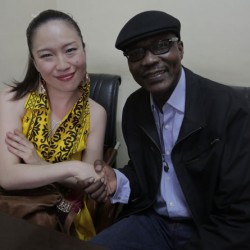
Tribute to the Late Jackton Malenya
We at Ketebul Music, wish to pay tribute to the legendary Jackton Malenya who died on the 13th of March, 2016. Mr Malenya met his tragic death when he was assaulted by unknown people on his way home late that evening. He is well known for the hit song “Mtoto si Nguo” which he sang with George Mukabi. The song was recorded in the 1960s.
Malenya was buried on the 29th of March in Buyangu, Bunyore in Vihiga County.
For those of you who don’t know about this Legend, here is a little more you need to know…
Jacktone Malenya was born in Kisa West in Kakamega, Western Kenya. Malenya’s father was a reverend in the Church of God, Kima Mission. He encouraged Malenya to join the church choir, where he learnt to play the guitar. However, he discouraged his son from joining a band. Soon after, Malenya teamed up with a childhood friend who hailed from the same neighborhood, George Mukabi, and they secretly started experimenting with secular music.
In 1957 they decided to move to Nairobi in search of new opportunities. Within that same year they found work with the East African Railways, Malenya working in the supplies department while Mukabi worked as an office messenger at the Railways Training School. Since they were both allocated houses at the Railways staff quarters in Makongeni estate it became convenient for them to meet and practice at the Makongeni Social Hall.
Malenya, who had better education than Mukabi, composed and wrote most of their initial compositions, with Mukabi playing the lone guitar.
Their first record, ‘Kweli Ndugu Sikilizeni’, with ‘Sengula’ on the flip side, was cut at African Gramophone Stores (AGS) studios in River Road in 1957. Their main competitors were the Jambo Boys, made up of Fundi Konde, Daudi Kabaka, Edouard Masengo and Fadhili William. Subsequent recordings were made at AP Chandarana, CMS, Andrew Crawford and a few other studios around town.
The duo achieved a lot of success with their music until tragedy struck in 1963, when Mukabi succumbed to wounds he received during a violent confrontation with his in-laws in Kakamega. After Mukabi’s death Malenya teamed up with his cousin Peter Akwabi, who was then a student at Butere Boys School, and continued recording. But just like Mukabi, Malenya’s life ended tragically when he was attacked by unknown people on his way home late that evening.
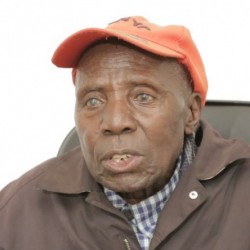
Oud Meets Swahili & Mijikenda Music
Ketebul Music and Alliance Française de Nairobi have been long standing partners in the project ‘Spotlight on Kenyan Music,’ which promotes and develops musical innovation that is rooted in diverse musical traditions of Kenya. To date, the Spotlight program has released 6 compilations. These recordings continue to serve as a bridge linking tradition and modernity.
In the month of May 2016, starting 9th -14th, Ketebul Music and Alliance Française de Nairobi will team up on a creative music workshop project; with the working title Oud Meets Swahili and Mijikenda Music. This project will bring Kenyan artists from the Swahili and Mijikenda cultures of the Kenyan coastal region to collaborate with the Franco-Tunisian oud maestro, Jean-Pierre Smadja, alias Smadj to compose, perform and produce music that will engage with the audiences.
This project intends to help uncover the link between the oud and the music from the Swahili and Mijikenda cultures found on the Kenyan coast. Smadj will be joined on this project by taarab singer Mwanate Kibwana from the group Lelele Africa and mwanzere singer Mohamed Said Ngana, better known as Bado, the son of legendary mwanzere singer Nyerere wa Konde.
The project, which is supported by the Instut Francais under their IFPROG umbrella, will feature a 3 day creative workshop which will culminate with 2 days of studio recording of the material generated at the workshop, and a 2 hour show at the Alliance Française de Nairobi gardens on the 14th of May 2016.
IFProg is a digital platform for cultural and artistic projects taking place abroad to deposit them in the annual device support of the French Institute.
More details on participants and schedule of the project will follow in due course.
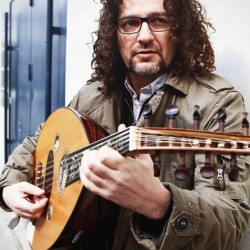
Ketebul Music Retracing Music From the Coast
The Ketebul Music crew has been in Mombasa, a city on the coastal region of Kenya since 20th of February 2016, on a quest to retrace music from that region. The aim of this trip is to prepare a 13-episode TV show that will be aired on a local media. This show will focus on the different styles and genres of music from the region, including both traditional and new generation music.
The show aims to showcase a contrast between 12 traditional and 12 modern musical groups. Within the two-week period the team, together with Diane Thram, Director of International Library of African Music (ILAM) will also repatriate music recorded earlier by ILAM exclusively from the coastal region.
Other than intensive interviews of both music groups , their audiences and instrument-makers, the show will also present live performances by both modern and traditional groups from the coastal region.
More on this to follow.
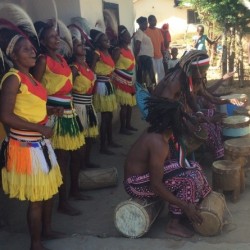
The Singing Wells Project : Rediscovering the lost Royal Drums of the Buganda Kingdom
The Singing Wells Project completed a succesful trip yet again and this time the focus was on Uganda. The Singing Wells project, now in it’s 4th year, is a partnership between Ketebul Music and Abubilla Music Foundation, which aims at preserving East Africa’s cultural music heritage now and for the future.
The journey to Uganda began on the 28th of November, 2015 when the team which included, Tabu Osusa, Founder, Ketebul Music Jimmy Allen, Founder Abubilla Music Foundation , Steve Kivutia, Patrick Ondiek, Hunter Allen and Nick Abonyo assembled in Kenya and flew to Uganda in the quest to rediscover the Lost Royal Drums of the Buganda Kingdom, the entenga drums.
Along with flutes, trumpets, strings and the xylophone, the entenga were part of a set of instruments used by palace musicians of the Buganda Kingdom whose job was to entertain the Kabaka (Baganda King). From an interview with Musisi, the last surviving drummer who played in the palace, we learnt that the Kabaka in the early 1960’s loved the entenga drums so much that he had the drummers play every morning at 3am. He felt that the drums were so perfect, that this was the only time of the day when it was quiet enough to appreciate them fully. This music largely died when the Buganda palace was attacked and destroyed on May 23-24 1966. The Kabaka fled, the musicians were disbanded and the drums as well as other instruments destroyed. Thereafter the entenge were considered dead.
That is until we discovered that Livingstone Musisi, who was 16 when the palace was destroyed, was alive and well in his home village. In 2013, encouraged by the works of James Isabirye, a lecturer at Kyambogo University in Uganda, as well as our partner for the Singing Wells project in Uganda who has been actively reviving the bigwara trumpets, we decided to revive the entenga drums. The Abubilla Music Foundation availed funds to James and Musisi and charged them with the task of assembling an entire set of entenga drums as well as putting together a team of musicians and train them in the almost extinct art of playing the entenga drums.
At the end of November 2015, armed with the recordings of palace musicians that were done by ethnomusicologist, Hugh Tracey, and thanks to the International Library of African Music, the Singing Wells embarked on our field trip which also included repatriating Hugh Tracey’s recordings to the last surviving palace musicians and institutions of learning in Uganda.
All through the few days we spent in Uganda, we learnt a great deal. On December 1, we traveled from Kampala to Jinja to the village of Bukakaire to listen to the Bukakaire Bigwara players led by the last surviving trumpeter from the Busoga palace, James Lugolole.
On the 2nd of December 2015, the team together with James Isabirye travelled to a shop called Ssebengwa Drum Makers, a shop run by a man called Abass Miriimu from the village of Mpampire. This village is famously known for their drum making skills. Abbas was a skilled drum maker of various Baganda traditional drums including the entenga.
Step by step he took us through the drum making process which included preparing the wood and letting it dry in the sun for 24 hours, then cutting the dry wood to size, preparing the outside of the drum, the two stages of stringing the drum, drying and rolling the cow hide strings, all the way to the final stage which is tuning the drums.
We then travelled to two separate villages to interview four other surviving members of the Kabaka’s Palace musicians. Richard Sewanyana, a flute palyer, Ssalongo Byakyalo Kakanzu one of the last surviving trumpet players, Ben Nsumbuga Ntabula a drummer and finally Kapolyano Kyobe a xylophone player whose father was killed during the attack.
December 3rd was our final day in Uganda before we headed back to Nairobi. We identified a whole set of extra ordinary musicians from our 2013 visit to Uganda and invited them for studio recording sessions at the Ketebul Music Studio.
More on the studio sessions soon.
For more on The Singing Wells click here
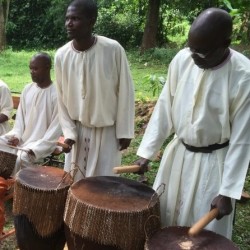
The Passing of a Legend; Michael Kinyany
Ketebul Music wishes to extend our condolences to the family of Michael Kinyany who passed away on the 18th of December 2015.
Michael Kinyany was a member of the group Lang Obiero that played benga and rumba in the 1950’s. Lang Obiero was among the groups recorded by ethnomusicologist Hugh Tracy in the early 1950’s. The group was one of the leading bands at that time and Michael was the youngest member.
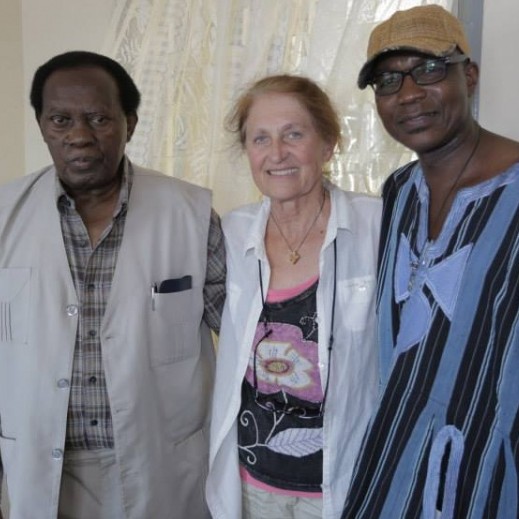
Left to right: Michael Kinyany Prof. Diane Thram (Director ILAM), Tabu Osusa (Founding Director Ketebul Music)
In August 2014, Ketebul Music in partnership with the International Library of African Music (ILAM) with the support of Abubilla Music Foundation repatriated some of these recordings which included Lang Obiero’s music. During that time, we met with and interviewed Michael and he gave us an insight on music in the 50’s and his take on music in general.
Kenyany was an astute business man and is a good example of how one can attain good education, be an entrepreneur and still be a great musician.
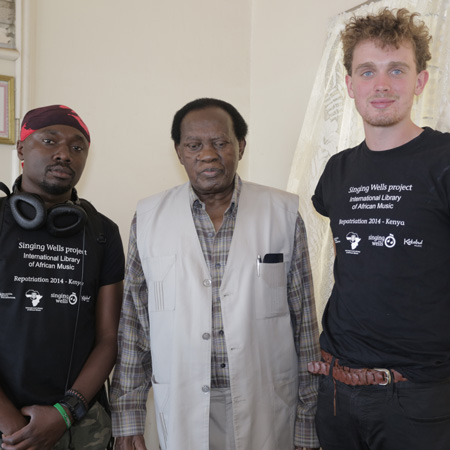
Left to right: Steve 64 (Ketebul Music Sound Engineer), Michael Kinyany Hunter Allen (Videographer Abubilla)
Ketebul Music will feature him in our book ‘Shades of Benga’ set to be launched soon.
Keep it here for updates on this and much more
